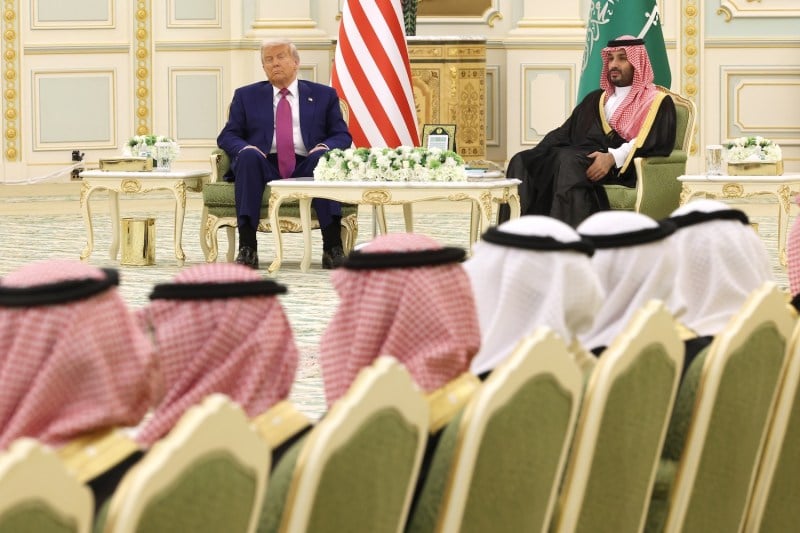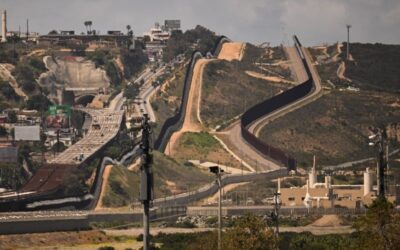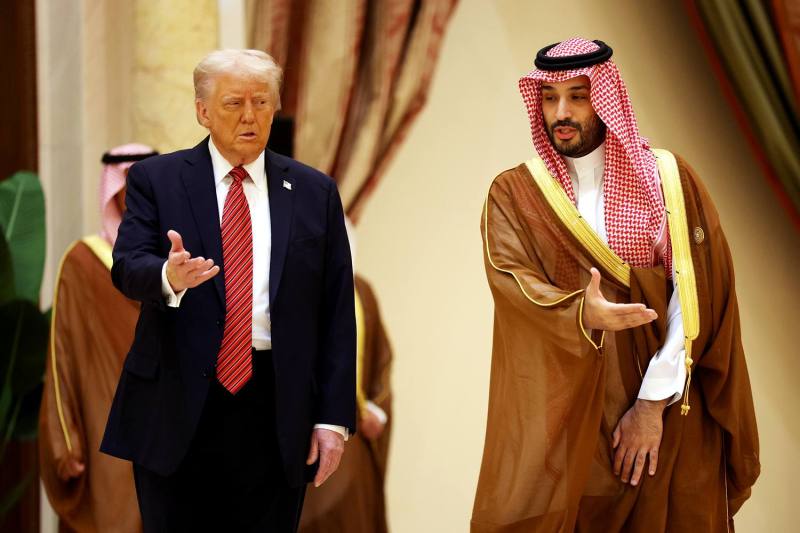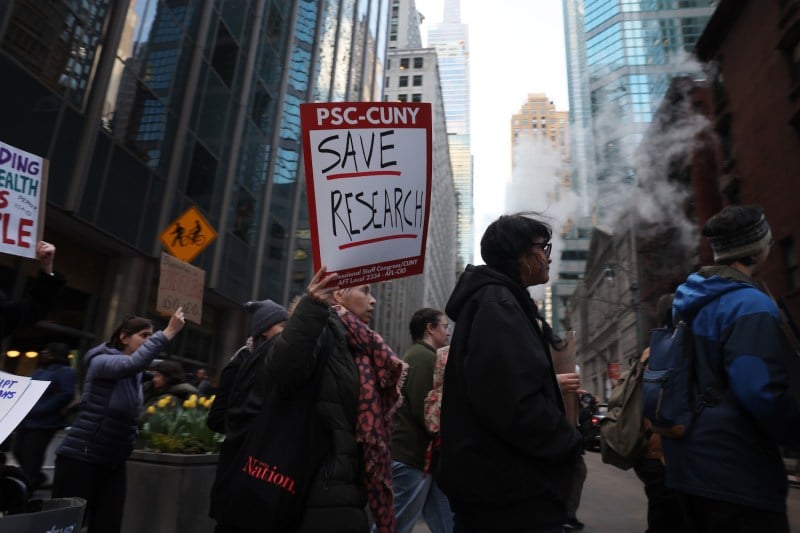Saudi Arabia Is Executing More People Than Ever

Saudi Arabia Is Executing More People Than Ever
Trump’s speech allows Mohammed bin Salman’s regime to continue its killing spree without censure.
U.S. President Donald Trump and Saudi Crown Prince Mohammed bin Salman attend a signing ceremony at the Saudi Royal Court in Riyadh, Saudi Arabia, on May 13. Win McNamee/Getty Images
U.S. President Donald Trump’s remarks in Riyadh will have terrifying consequences for the people of Saudi Arabia.
In recent years, Crown Prince Mohammed bin Salman has learned that his regime can execute human rights protesters and child defendants without international censure. But on Tuesday, Trump said the quiet part out loud. To Saudi Arabia’s de facto ruler, the president’s promise of no more “lectures on how to live or how to govern your own affairs” translates as “kill as many people as you want, for whatever reason.”
U.S. President Donald Trump’s remarks in Riyadh will have terrifying consequences for the people of Saudi Arabia.
In recent years, Crown Prince Mohammed bin Salman has learned that his regime can execute human rights protesters and child defendants without international censure. But on Tuesday, Trump said the quiet part out loud. To Saudi Arabia’s de facto ruler, the president’s promise of no more “lectures on how to live or how to govern your own affairs” translates as “kill as many people as you want, for whatever reason.”
Not long ago, I received a call from the mother of an Egyptian man on death row in Saudi Arabia. She told me he had been moved to an execution cell in Tabuk prison, near the Jordanian border, with around two dozen other Egyptian nationals. Every few days, guards would drag someone out to be killed. She compared the men to sheep herded into a slaughterhouse.
Relatives of other men confirmed her account. The guards appeared to relish inflicting terror, they said, by telling the prisoners a day in advance that an execution had been scheduled—but not saying who. The men would spend a night in panic and confusion, fearing the next dawn would be their last.
This is the reality of Mohammed bin Salman’s Saudi Arabia. The “land of peace, safety, harmony” extolled by Trump is one of the world’s most repressive dictatorships and most prolific executioners.
At least 345 people were executed in Saudi Arabia last year, according to official announcements cross-checked by Reprieve and the European Saudi Organisation for Human Rights. This was a 76 percent increase from the previous high of 196 executions in 2022, including record numbers of women (nine), alleged drug offenders (122), and foreign nationals (138). The ongoing killing spree is unprecedented.
The men in the death cell in Tabuk are not murderers. Our clients Ahmed Zeinhom and Rami al-Najjar, a textile worker and taxi driver, were caught with 8 grams of cannabis and convicted on manufactured drug-smuggling charges. They could be executed at any time for recreational drug use that is legal in 24 U.S. states.
This directly contradicts Mohammed bin Salman’s false claims to have restricted capital punishment to “if a person kills a person” and to have gotten “rid of all of it, except for one category … written in the Quran.” In fact, the death penalty is being applied more widely than ever. Dissent is punishable by death, and anyone smoking marijuana risks their life.
Saudi officials lie constantly about this. At a United Nations committee session I attended last year in Geneva, a spokesperson claimed that the country only executes people for the most serious violent crimes, ignoring the execution of a Nigerian for alleged drugs offenses just three days earlier.
The regime similarly claims to have abolished the death penalty for childhood crimes, yet Abdullah al-Howaiti, who was 14 years old when he was tortured into falsely confessing to a murder, remains on death row. Abdullah al-Derazi could also be executed at any time for the alleged crime of attending protests when he was 17.
The crown prince is acutely sensitive to international criticism—sensitive enough to order the assassination of journalist Jamal Khashoggi in 2018, according to the CIA. Last week, British citizen Ahmed al-Doush was sentenced to 10 years in a Saudi prison, apparently for a single deleted tweet—although the Saudi justice system is so secretive that even the British government doesn’t know what crime he was convicted of.
So, while we cannot say for certain why executions have surged—in a country with no constitution, penal code, independent legislative body, or free press—we can reasonably speculate that the regime takes international opinion into account. With attention focused on Israel, Gaza, Lebanon, and Syria, Saudi authorities saw an opportunity to step up executions without diplomatic fallout.
In the graph representing executions in Saudi Arabia, there is a dip in 2020 and 2021. Partly this was due to COVID-19 lockdowns and partly an undeclared moratorium on executions for drug offenses. But with hindsight, it was also the brief moment when the regime feared meaningful consequences for Khashoggi’s murder. Once it became apparent there would be none, the killing intensified.
Gianni Infantino, the president of FIFA, soccer’s governing body, was in the audience for Trump’s speech, months after awarding the 2034 World Cup to Saudi Arabia in a process with no rival bidders.
Meanwhile, daily executions, often in batches, have become the new normal. Despite the traditional monthlong pause for Ramadan, the Saudi regime has already executed 112 people so far this year, including 68 convicted of drug offenses and 12 of nonlethal “terrorism” offenses, which in practice often means that they protested against the regime and were then tried, convicted, sentenced, and executed in secret.
Trump’s ode to the “beautiful thing that’s happening” in Saudi Arabia made it clear that as far as his administration is concerned, Mohammed bin Salman’s regime has total impunity. Other world leaders may be less candid, but we have seen time and again that they lack the moral courage to object to Saudi atrocities.
I fear that this new, openly transactional geopolitical era will be a very dark time for the Saudi people and that in the shadows of the “expanding personal freedoms” praised by Trump, many more innocent lives will be cut short.
This post is part of FP’s ongoing coverage of the Trump administration. Follow along here.
Taha al-Hajji is a Saudi Arabian capital defense lawyer and legal consultant for the European-Saudi Organisation for Human Rights. He lives in exile in Germany, having been threatened with reprisals for his work defending children from execution.
More from Foreign Policy
-

Indian Air Force personnel stand in front of a Rafale fighter jet during a military aviation exhibition at the Yelahanka Air Force Station in Bengaluru. A Tale of Four Fighter Jets
The aircraft India and Pakistan use to strike each other tell a story of key geopolitical shifts.
-

A cardinal in a black robe with red sash with hands folded in front of him walks past a stage and steps. Conclave Sends Message With American Pope
Some cardinals had been agitating for U.S. leadership to counter Trump.
-

An illustration shows red tape lines crossing over and entrapping a semiconductor chip. Is It Too Late to Slow China’s AI Development?
The U.S. has been trying to keep its technological lead through export restrictions, but China is closing the gap.
-

A man watches a news program about Chinese military drills surrounding Taiwan, on a giant screen outside a shopping mall in Beijing on Oct. 14, 2024. The Pentagon Fixates on War Over Taiwan
While U.S. military leaders fret about China, Trump has dismissed the Asia-Pacific.











Join the Conversation
Commenting on this and other recent articles is just one benefit of a Foreign Policy subscription.
Already a subscriber?
.
Subscribe
Subscribe
View Comments
Join the Conversation
Join the conversation on this and other recent Foreign Policy articles when you subscribe now.
Subscribe
Subscribe
Not your account?
View Comments
Join the Conversation
Please follow our comment guidelines, stay on topic, and be civil, courteous, and respectful of others’ beliefs.
Change your username |
Log out
Change your username:
CANCEL
Confirm your username to get started.
The default username below has been generated using the first name and last initial on your FP subscriber account. Usernames may be updated at any time and must not contain inappropriate or offensive language.